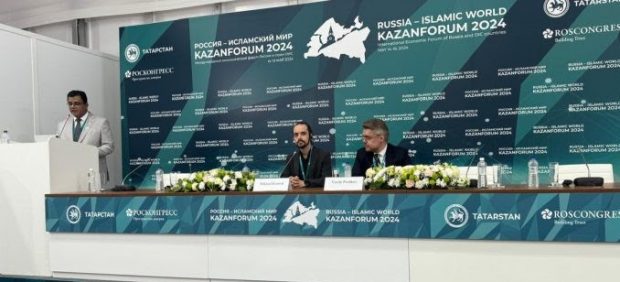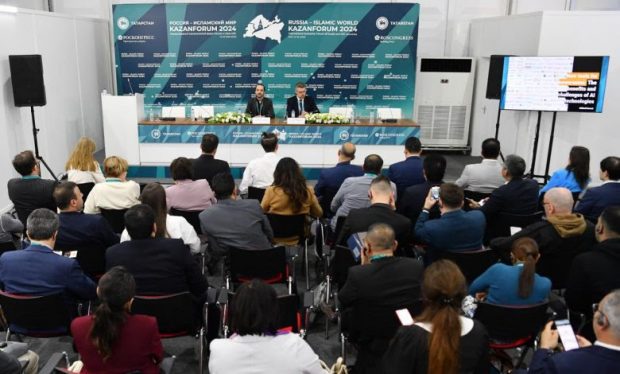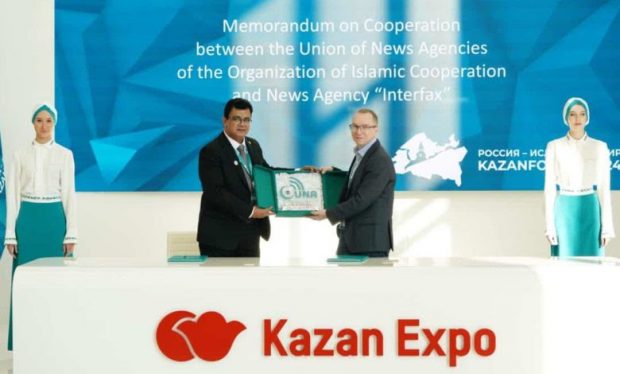
KAZAN: A “New Tools for Newsrooms: Exploring the Benefits and Challenges of Artificial Intelligence Technologies” workshop was held by the Union of News Agencies of the Organization of Islamic Cooperation (UNA) in cooperation with the Russian agency “Sputnik” and the “Tatmedia” news agency in Tatarstan.
The workshop held within the Kazan Forum 2024 was attended by media professionals and heads of news agencies in the OIC member countries. It was also broadcast online to allow remote attendance for media professionals.
UNA Director General Mohammed bin Abd Rabbo Al Yami stressed that holding the workshop on the sidelines of the “Kazan Forum”, the most important platform for cooperation between Russia and the Islamic world, is an indicator of the priority of cooperation in the media, whether in the agendas and programs of the forum, or in Russia’s vision for cooperation with the Islamic world.
Al Yami told the attendance that he was hopeful the workshop will contribute to providing journalists with the skills they need to keep pace with the rapid technical transformations in the information landscape.
Sputnik News and Radio Director of International Cooperation at Vasily Pushkov explained that the workshop is within the framework of effective cooperation between UNA and media institutions in Russia, led by Sputnik.

During the workshop, Director of Special Projects at Sputnik News and Radio Agency Mikhail Conrad reviewed the current reality of artificial intelligence and its uses in the media.
He highlighted the main tools of artificial intelligence that newsrooms can benefit from, depending on the type of media material and whether it is text, video or audio material, and indicated that some artificial intelligence algorithms save time and effort for journalists.
In his arguments, Conrad presented models of journalistic materials written entirely by artificial intelligence, and said that this type of journalistic material generated through artificial intelligence is often limited to sports news.
He addressed the pros and cons of innovative solutions and open-source software, and how to benefit from their possibilities.
Discussing the future of journalistic work in light of the rapid development of artificial intelligence, he stressed that the human element will remain the most important in media production, and that the practical applications of artificial intelligence are the ones that will remain and last in journalistic work.
The workshop was part of a series of media programs and courses co-organized by UNA and Sputnik, within their partnership to achieve their goals and vision regarding training and enhancing aptitudes.

Within its open policy and multiple-partnership approach, UNA has signed a memorandum of cooperation with the Russian Interfax Agency, on the sidelines of the Kazan Forum 2024.
The MoU aims to expand partnership and cooperation between the two sides, including the exchange of news content, coverage of important events related to ties between Russia and the OIC countries, as well as international news in English, Arabic and French.
The MoU also aims to establish cooperation between the Union and Interfax on joint media projects, exchanging experiences and technical cooperation.
“The memorandum is within the framework of strengthening the Union’s partnerships with international media institutions to address common media issues, and to intensify the media presence of the Organization of Islamic Cooperation and its various institutions in the international media, thus contributing to highlighting its various activities and initiatives,” Al Yami said.
UNA has previously signed memorandums of cooperation with a number of media organizations in Russia, including Sputnik, Viory, Tatmedia, and RT Arab.




